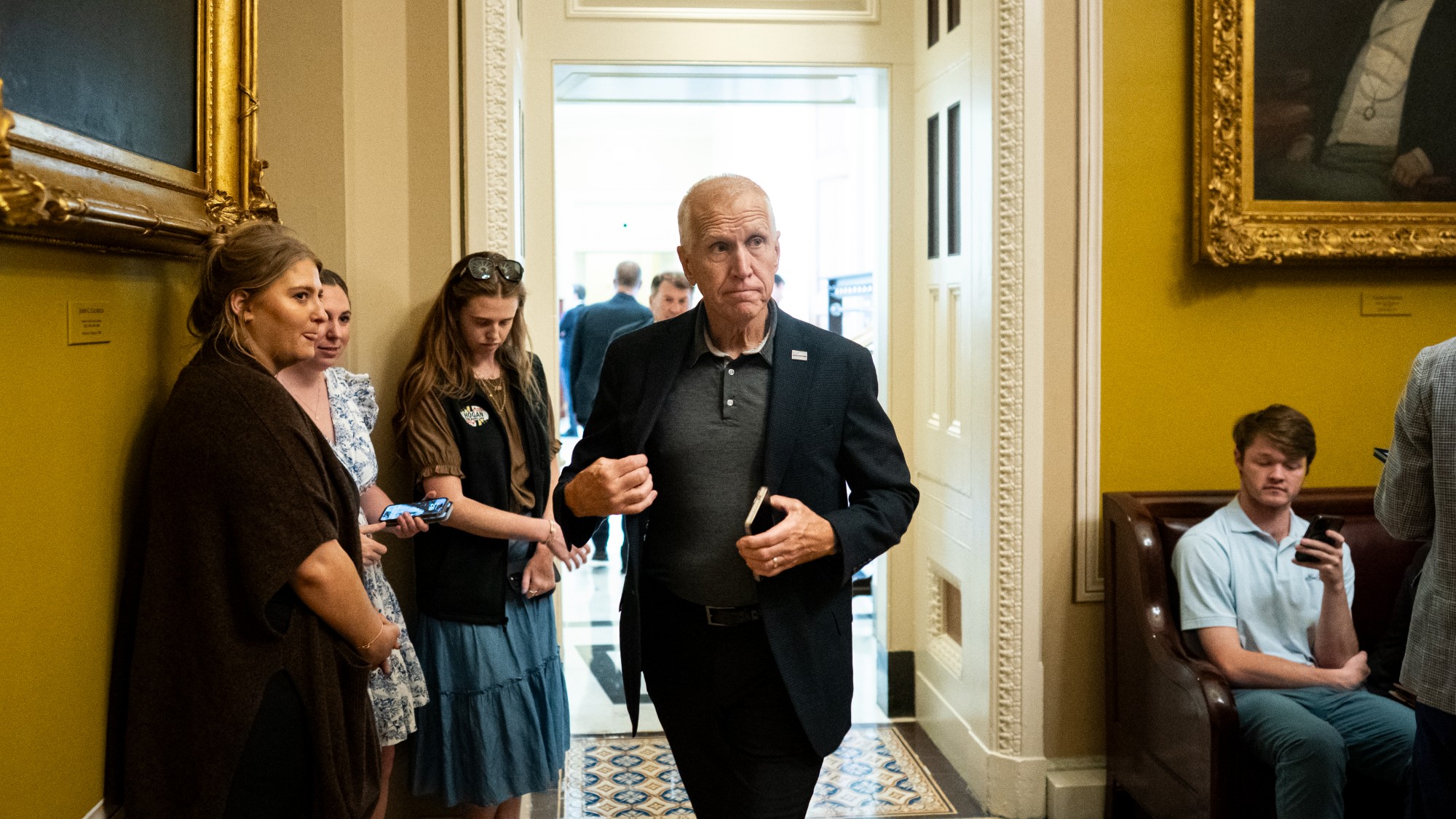Senate advances GOP bill that costs more, cuts more
The bill would make giant cuts to Medicaid and food stamps, leaving 11.8 million fewer people with health coverage


A free daily email with the biggest news stories of the day – and the best features from TheWeek.com
You are now subscribed
Your newsletter sign-up was successful
What happened
Senate Republicans advanced President Donald Trump's "One Big Beautiful Bill" late Saturday on a 51-49 vote. Democrats and the two Republicans who voted against moving forward with the legislation, Sens. Rand Paul (Ky.) and Thom Tillis (N.C.), denounced the bill during hours of debate Sunday. Earlier in the day, Tillis had said he would not seek re-election next year.
Who said what
The Congressional Budget Office estimated Sunday that the Senate bill would add $3.3 trillion to the deficit by 2034, versus $2.4 trillion for the House version, to extend $3.8 trillion in tax breaks, add about $200 billion in new breaks and allocate $150 billion more for immigration enforcement and another $157 billion for the military. To partially offset these costs, it would cut $1.2 trillion, primarily from Medicaid and food stamps, leaving 11.8 million fewer people with health coverage, compared with 10.9 million in the House bill.
Tillis said on the Senate floor that the Medicaid cuts "will betray the promise Donald Trump made" and "hurt people who are eligible and qualified for Medicaid." Trump and other GOP leaders say only "fraudsters, illegal immigrants" and ineligible people would lose coverage, The New York Times said. But "that claim rests on a maneuver embedded throughout the sprawling legislation: Instead of explicitly reducing benefits, Republicans would make them harder to get and to keep," turning mounds of new "paperwork" into "hundreds of billions of dollars in savings." Senate Minority Leader Chuck Schumer (D-N.Y.) said it would leave Americans "mummified in new red tape."
The Week
Escape your echo chamber. Get the facts behind the news, plus analysis from multiple perspectives.

Sign up for The Week's Free Newsletters
From our morning news briefing to a weekly Good News Newsletter, get the best of The Week delivered directly to your inbox.
From our morning news briefing to a weekly Good News Newsletter, get the best of The Week delivered directly to your inbox.
Republicans, "who have long voiced concern about growing U.S. deficits and debt, have rejected the CBO's longstanding methodology to calculate the cost of legislation," Reuters said, and the Senate GOP is using an accounting maneuver to project deficit reduction. But Paul said on the Senate floor that the GOP bill's $5 trillion debt limit hike was an "admission that they know they aren't controlling the deficit" but rather adding "trillions more."
What next?
The Senate plans to start 20 hours of voting on amendments Monday morning. Republicans are facing a Trump-imposed deadline to get the bill to his desk by Friday, which would require the House to approve any Senate version that passes out of the upper chamber.
A free daily email with the biggest news stories of the day – and the best features from TheWeek.com
Peter has worked as a news and culture writer and editor at The Week since the site's launch in 2008. He covers politics, world affairs, religion and cultural currents. His journalism career began as a copy editor at a financial newswire and has included editorial positions at The New York Times Magazine, Facts on File, and Oregon State University.
-
 Labor secretary’s husband barred amid assault probe
Labor secretary’s husband barred amid assault probeSpeed Read Shawn DeRemer, the husband of Labor Secretary Lori Chavez-DeRemer, has been accused of sexual assault
-
 Trump touts pledges at 1st Board of Peace meeting
Trump touts pledges at 1st Board of Peace meetingSpeed Read At the inaugural meeting, the president announced nine countries have agreed to pledge a combined $7 billion for a Gaza relief package
-
 Britain’s ex-Prince Andrew arrested over Epstein ties
Britain’s ex-Prince Andrew arrested over Epstein tiesSpeed Read The younger brother of King Charles III has not yet been charged
-
 Labor secretary’s husband barred amid assault probe
Labor secretary’s husband barred amid assault probeSpeed Read Shawn DeRemer, the husband of Labor Secretary Lori Chavez-DeRemer, has been accused of sexual assault
-
 Trump touts pledges at 1st Board of Peace meeting
Trump touts pledges at 1st Board of Peace meetingSpeed Read At the inaugural meeting, the president announced nine countries have agreed to pledge a combined $7 billion for a Gaza relief package
-
 NIH director Bhattacharya tapped as acting CDC head
NIH director Bhattacharya tapped as acting CDC headSpeed Read Jay Bhattacharya, a critic of the CDC’s Covid-19 response, will now lead the Centers for Disease Control and Prevention
-
 Witkoff and Kushner tackle Ukraine, Iran in Geneva
Witkoff and Kushner tackle Ukraine, Iran in GenevaSpeed Read Steve Witkoff and Jared Kushner held negotiations aimed at securing a nuclear deal with Iran and an end to Russia’s war in Ukraine
-
 Pentagon spokesperson forced out as DHS’s resigns
Pentagon spokesperson forced out as DHS’s resignsSpeed Read Senior military adviser Col. David Butler was fired by Pete Hegseth and Homeland Security spokesperson Tricia McLaughlin is resigning
-
 Judge orders Washington slavery exhibit restored
Judge orders Washington slavery exhibit restoredSpeed Read The Trump administration took down displays about slavery at the President’s House Site in Philadelphia
-
 Hyatt chair joins growing list of Epstein files losers
Hyatt chair joins growing list of Epstein files losersSpeed Read Thomas Pritzker stepped down as executive chair of the Hyatt Hotels Corporation over his ties with Jeffrey Epstein and Ghislaine Maxwell
-
 Judge blocks Hegseth from punishing Kelly over video
Judge blocks Hegseth from punishing Kelly over videoSpeed Read Defense Secretary Pete Hegseth pushed for the senator to be demoted over a video in which he reminds military officials they should refuse illegal orders
